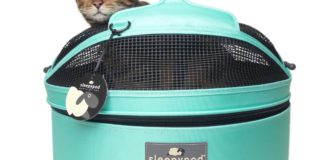5 Things You Should Know Before Getting a Ferret
Share

Ferrets are amazing animals. We love watching them hop around, curl up into a tight little ball to doze the day away, and the way they steal anything they find interesting – laughing as they run away with the item. They are the most entertaining pet you can have and make great pets.
That said, there are a few things you should know before you run out to the store and buy one. We have them listed below and hope you’ll take time to read before adopting.
Here are five things you should know before bringing home a ferret.
1. They’re illegal in many areas of the country
For a list of states in which ferrets are illegal, click here.
2. They’re very smart and are mischievous
They are super smart and require a great deal of stimulation and activity so they don’t get bored. You’ll need to keep them in a very large cage (or ferret-proofed area) that has been outfitted with plenty of things for them to play with (we have some suggestions in other articles). Ferrets should not be confined for long periods of time. You will need to let them out of their cages for at least four hours a day and two of those should include human interaction. Ferrets are social creatures and do require a lot of time.
3. They require a lot of care (despite sleeping 18 hours a day) and don’t tolerate heat

Feeding: They’re obligate carnivores, which emans they eat in much the same way a cat eats.
Cleaning: You’ll
Playtime:
Veterinarian Care: They require vaccinations and regular checkups at the veterinarian. You’ll need to find a veterinarian that specializes in exotics (or at least has a strong knowledge of working with ferrets) and they may be slightly more expensive to treat.
Cage: The ferret’s cage or safe area should include plenty of safe toys, a litter box (or two) filled with a wood-based litter, and a soft place to sleep. Many ferrets enjoy hammocks that hang from the cage, but some prefer to just sleep in a soft bed that is in a protected area of the cage. You’ll need to determine what works for your ferret’s personality.
Your ferret’s living space should be temperature-controlled. The temperature needs to be kept between 50 and 80 degrees Fahrenheit. Ferrets are very susceptible to heat and shouldn’t be kept in areas that reach above 85 degrees Fahrenheit or in an area where they cannot escape direct sunlight.
4.They’re prone to specific issues: Adrenal glands, cancer, prolapsed sac, respiratory infections
Ferrets can be prone to a number of health issues. A high-quality diet and excellent care will help alleviate many of these issues, but you should be aware that you may be spending some time at the veteirnarians’ office. Here is a very helpfuil chart that will show you some of the things you should be aware of:
http://www.marshallferrets.com/uploads/files/ferret_healthcare/REV4symptomchart.pdf
5. They have a musky odor
Be sure you’re very aware of their musk.










